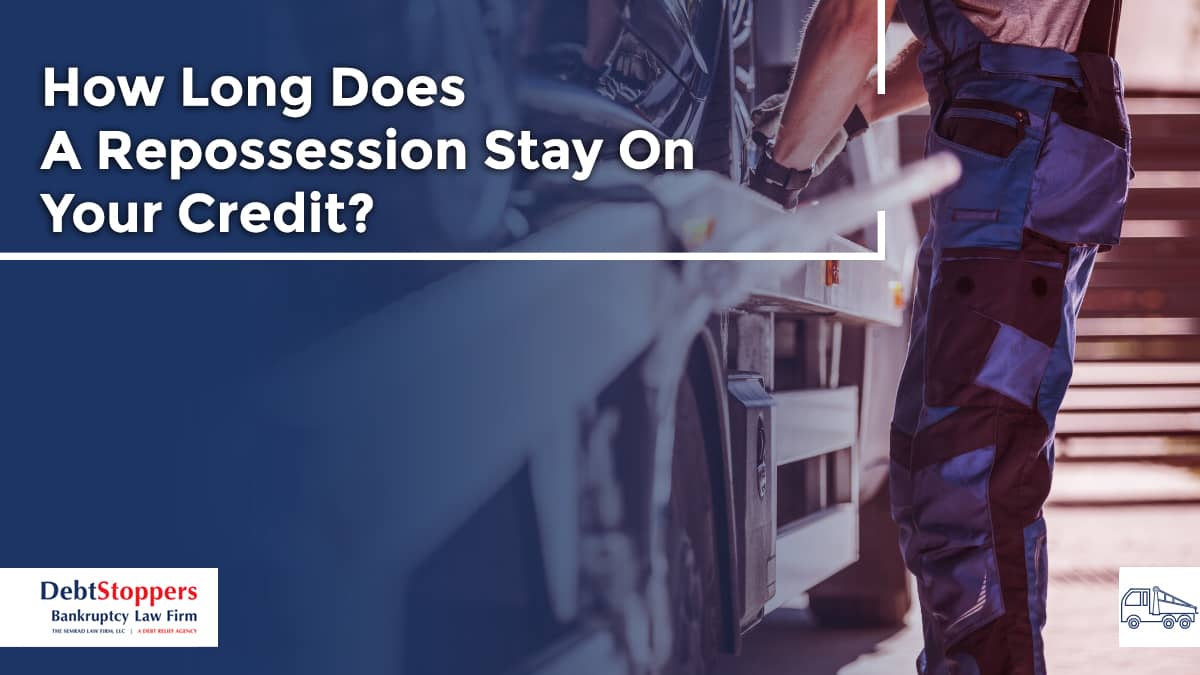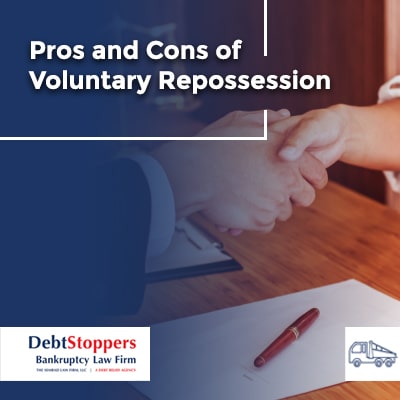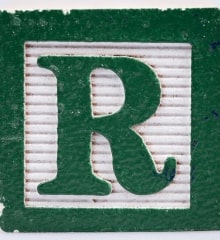How Long Does A Repossession Stay On Your Credit?

If you are worried about a repossession or have recently faced a repossession, you may be wondering how long it stays on your credit report. You may also be wondering how a voluntary repossession works, the pros and cons of voluntary repossession, and how to decide if it’s the right option for you.
For the past several years, an increasing number of people have been feeling extreme financial pressure. American consumers continue to be negatively impacted by inflation, rising prices, and an uncertain economy. As budgets are stretched thinner and thinner, more and more people are falling behind on their monthly payments – especially credit cards and car payments.
If you cannot make your car payment, you may be in danger of having your car repossessed. Last year, more than 1.5 million vehicles were repossessed in the U.S. Americans often rely on their vehicles to get to work and provide for their families. The thought of losing your car can feel overwhelming, but it’s important to understand your options. If you are facing a repossession, you have options, but you need to act quickly.
How Does Voluntary Repossession Work?
Voluntary repossession means that you willingly return your vehicle. A voluntary repossession is an option some borrowers choose if they know they can’t make their monthly vehicle payments. In many ways, a voluntary repossession is similar to an involuntary repossession, but it gives the borrower more options. In some cases, a voluntary repossession is preferred by borrowers because it avoids the inconvenience and embarrassment that often comes with involuntary repossession.

Pros and Cons of Voluntary Repossession
People are often surprised to learn how quickly a repossession can happen. If you miss even one payment, you may be at risk of losing your vehicle to repossession. It’s also important to know that laws vary by state. For example, depending on the state and the terms of your contract, you may or may not receive notice before your vehicle is repossessed. If you are facing a repossession, you should fully understand your options, including the pros and cons of a voluntary repossession.
Pros of Voluntary Repossession
The pros of voluntary repossession are the flexibility it offers. Simply put, an involuntary repossession happens when and where possible. Meaning the repo man will grab your car when he can, not when it’s more convenient for you. Oftentimes, people will leave their job and discover their car is no longer in the parking lot.
A voluntary repossession allows the borrower to determine the time and location to surrender the property. This can help a person avoid embarrassment and costs in the short term. Some people may opt for a voluntary repossession because they know they cannot make their payments and it’s only a matter of time before the repo man takes their car and leaves them stranded.
If you take proactive steps to initiate a voluntary repossession, your lender may be more willing to work with you, which can help mitigate some of the short-term pain. Additionally, as you work to rebuild your credit, a voluntary repossession may give you the opportunity to make a case that you are a more responsible borrower.
Cons of Voluntary Repossession
The primary con of a voluntary repossession is that it appears on your credit report the same as an involuntary repossession. Additionally, voluntary repossession leaves you without your car.
A lot of Americans depend on their vehicle to provide for their families and make a living – they cannot simply surrender their car. For people who cannot imagine voluntarily giving up their car, you should contact an attorney to explore your other options. An experienced consumer protection attorney can review your case and help you understand your rights and options. An attorney may be able to help re-negotiate the terms of your loan or a cramdown. Alternatively, an attorney can help you understand if filing for bankruptcy may be a good option for you.
If you file for bankruptcy, an automatic stay will go into effect immediately, which stops any collection actions or repossessions from moving forward. This can help buy you valuable time to restructure or discharge unsecured debt and make life affordable again.

How Long Does a Repossession Stay on Your Credit?
A voluntary repossession can stay on your credit report for seven years. This is true of both voluntary and involuntary repossession.
Both voluntary and involuntary repossession can negatively impact your credit score for up to seven years; however, the impact will lessen over time. During the seven years when the negative mark shows on your credit report, you will probably face less favorable lending terms, including higher interest rates.
How to Fix Your Credit After a Repossession?
During the seven years following a voluntary or involuntary repossession, you should focus on rebuilding your credit. When the seven years pass, the repossession will no longer be included on your credit report, which should significantly improve your credit score. However, you don’t have to wait for that to happen to start repairing your credit.
After a repossession, you should be proactive to repair your credit score and rebuild your credit history. You can start by creating a realistic budget that helps you focus on paying all of your bills on time and avoid taking on any additional debt. Over time, your credit history will show a positive track record. It’s important to remember that your credit score is not set in stone – with consistent effort, you can repair your credit.





